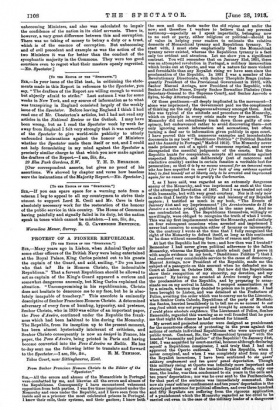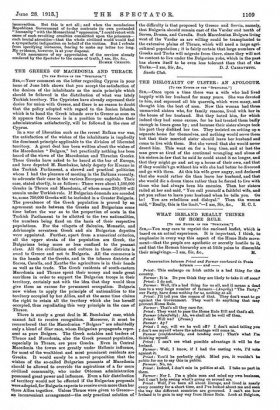From Senhor Francisco Homem Christo to the Editor of the
"Spectator."
S111,—All the errors and abuses of the Monarchists in Portugal were combatted by me, and likewise all the errors and abuses of the Republicans. Consequently I have encountered vehement opposition from both parties. I was five times imprisoned under the Monarchy and once under the Republic, and I have seen from the inside and as a prisoner the most celebrated prisons in Portugal. 1 know their cells, their systems, and their gaolers; I know both the men and the facts under the old regime and under the new; and therefore I venture to believe that my personal testimony—especially as I speak impartially, belonging now to no sect or party, either religious or political—should be of value in helping your readers to estimate the relative demerits of Monarchical tyranny and Republican tyranny. To start with, I must state emphatically that the Monarchical tyranny never existed, whereas the Republican tyranny is a fact only too evident and atrocious. Lot me show you a significant contrast. You will remember that on January 31st, 1891, there was an attempted revolution in Portugal, a military insurrection which broke out at Oporto, and was of a nature far more violent and formidable than any Royalist rising we have seen since the proclamation of the Republic. In 1891 I was a member of the Revolutionary Directorate, with Senhor Theophile Braga (subse- quently President of the Provisional Government in 1910), with Senhor Manuel Arriaga, now President of the Republic, with Senhor Jacintho Nunes, Deputy Senhor Bernadine Pinheiro (then Secretary-General to the Supreme Court), and Senhor Azevedo o Sylva, to-day Attorney-General.
Of these gentlemen—all deeply implicated in the movement—I alone was imprisoned; the Government paid me the compliment of thinking me the only dangerous adversary amongst them. And this was typical of the attitude and procedure of the Monarchy, which on principle in every crisis made very few arrests. The Monarchy did not relentlessly track down those guilty of con- spiracy, but endeavoured rather to avoid discovering them—not only ignoring secret information and accusations, but often turning a deaf ear to information given publicly in open court. I have proved this with numerous examples and incontestable documents in my book " Banditismo Politico" ("Political Bandits and the Anarchy in Portugal," Madrid 1912). The Monarchy never made prisoners out of a spirit of venomous reprisal, and never disregarded the merciful judgments of the courts. But the Republic hunts for conspirators, accepts all accusations against suspected Royalists, and deliberately (out of rancorous and vindictive cruelty) excites in certain fanatics a veritable lust for persecution; so that it is by no means unusual for an innocent man, who has been acquitted in court (for lack of any evidence against him) to find himself set at liberty only to be arrested and imprisoned again for no reason except to gratify the Carbonarios.
I, as I have said, was regarded as an extremely dangerous enemy of the Monarchy, and was imprisoned as such at the time of the attempted Revolution of 1891. But I was treated not only with humanity, but with very great courtesy. Nor is it only now in exile that I testify to the civility and leniency of my Royalist captors ; I testified as much in my book, " The Events of January 31st and my Imprisonment" (Os Acontecimentos tie 31 de Janeiro e a minha priscie), published in the same year. And no one contradicted me. The Republicans themselves, willingly or unwillingly, were obliged to recognize the truth of what I wrote. This was my first imprisonment under the Monarchy, and similarly on four subsequent occasions when arrested and imprisoned I never had occasion to complain either of tyranny or inhumanity. On the contrary I wrote at the time that I fully recognized the right of the Monarchy to defend itself, as long as this continued to be done without exceeding the limits of reason and justice.
At last the Republic had its turn ; and how then was I treated ? Remember I had never given political adherence to the fallen Monarchy, whereas the Republican chiefs admit (and I prove it with ample evidence in my book, " Banditismo Politico ' ) that I had rendered very considerable service to the cause of democracy. Manuel Arriaga, now President of the Republic, made me the subject of a panegyric on this account when he defended me in Court at Lisbon in October 1908. But how did the Republicans show their recognition of my sincerity, my devotion, and my services ? By having me arrested at Aveiro twenty days after the proclamation of the Republic, and by preparing to assas- sinate me on my arrival in Lisbon. I escaped assassination as if by a miracle, whereon they decided to poison me in prison. I had been brought to Lisbon, and was detained at the Prefecture of Police, awaiting the order which was to convey me to the Limoeiro, when Senhor Costa Cabedo, Republican of the party of Machado dos Santos, hurried breathlessly in to tell me on no account to eat any food which was not prepared and brought by someone in whom I could place absolute confidence. The Lieutenant of Police, Senhor Esmeraldo, regarded this warning as so well founded that he gave me that night the dinner he had ordered for himself.
My arrest and projected murder were designed as punishment for the monstrous offence of protesting in the press against the actions of certain individual Republicans who were unworthy of public trust. Contrast, Sir, the "Monarchical tyranny" with the boasted "humanity and justice" of the Republic ! On January 31st, 1891, I was acquitted by court-martial, because although declaring myself a Republican conspirator, I said truly that I had not approved the Oporto outbreak. Under the Republic, when I never conspired, and when I was completely aloof from any of the Royalist incursions, I have been sentenced to six years' solitary confinement and ten years' penal deportation. Though this military rising at Oporto was infinitely more important and threatening than any of the tentative Royalist efforts, only one man, the leader, was then condemned to six years in the cells and ten years' deportation ; nor was he ever sent to the Penitenciaria, for that part of the sentence was immediately commuted. But now six years' solitary confinement and ten years' deportation is the
stereotyped sentence for political offenders, and over three hundred and fifty Royalists are suffering from the rigorous application
of a punishment which the Monarchy regarded as too cruel to be carried out even in the case of the military leader of a dangerous insurrection. But this is not all ; and when the mendacious Republican Government of to-day contrasts its own pretended " humanity" with the Monarchical " oppression," I could retort with cases of such revolting cruelties committed upon the prisoners— such brutal atrocities—that the whole civilized world would feel a sympathetic indignation on behalf of the victims. But I refrain from specifying instances, fearing to make my letter too long. My evidence, however, is at your disposaL
With assurances of my appreciation of the services already rendered by the Spectator to the cause of truth, I am, Sir, &c., HOMER CHBISTO.



























































 Previous page
Previous page